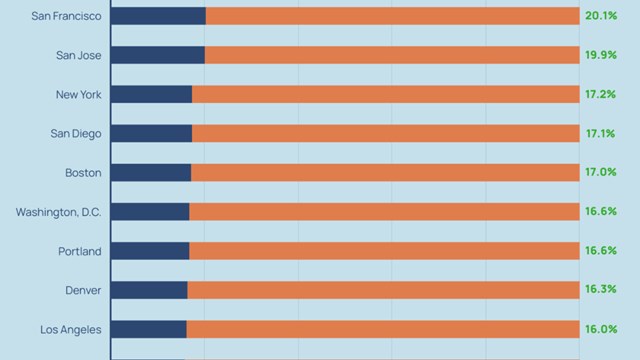Imagine sitting down with your significant other to pay the monthly bills. You both put your checks into a joint account and know how much there is to take care of expenses, or so you think. Out of his wallet your husband pulls out receipts for a new suit, dinner with his friends and a new part for the beat up old Chevy he’s rebuilding. You add receipts for a manicure, a brand new red dress that’s hanging in your closet and the liquid lunch that you had with your pals from work. Both of you look at the pile, each upset that the other wasn’t notified about all the extra spending, and wondering how you’re going to cover your household bills now.
Money—and the spending of it—is a topic that some people are very skittish about discussing, but when you’re a board member or the property manager of a residential co-op or condo building however, there’s no benefit to skirting financial realities just because they may be difficult or contentious.
Tell All?
Budgets and financial reports provide that crystal-clear picture of how the property is doing. From an investment perspective, it shows the shareholders, tenants, owners and board whether the property is profitable or not. CynthiaGraffeo, director of client relations at Argo Real Estate in Manhattan, says that what information the board shares about the building’s financial information will also depend on what’s been traditionally done in the past for that building.
“Finances are one of the biggest components of the building, so shareholders want to make sure the board is meeting their financial obligations,” says Graffeo. “You want to be open to them with annual financial statements and letters that explain when a board decides to increase the maintenance or do an assessment.”
Each month, a financial report should be generated to give the residents and the board an idea of where the building is at from a monetary standpoint. This report compares where the budget is to where it should be. In addition, it also has a listing of all the bills that were paid and the monies that were collected. In other words, anything financial that has happened that month should be in the report.
“If a board decides they don’t want to be really open, they don’t publish their operating budget,” says Graffeo, adding that an operating budget is an annual budget that includes such expenses as salaries, taxes, utilities, maintenance fees and insurance. “Residents don’t understand that it’s a working budget and then have questions and concerns about what’s spent,” she says.
But while it's understandable that a board might not want to have non-board residents peering over their shoulder at every single nickel and dime, being opaque about finances is not the solution. “I’m puzzled when I see a board that is keeping things really close to the vest. I see it fairly often and I find it a little disturbing,” says Christine E. Evans, CMCA, PCAM, the regional vice president of Associa in Florida. Associa is one of the nation’s largest property management companies, with several offices in the New York-New Jersey metro area.
A Team of Experts
Most management teams utilize the services of a certified public accountant (CPA) or an accounting firm to complete audits, reviews, budgets and more on a monthly, quarterly or annual basis.
“CPAs examine everything—every invoice and every account,” says Evans. “Their work is contingent on what the board has paid for. Sometimes the board will pay for something very basic like reviewing the financial statements for obvious errors. It all depends on the complexity of the association.”
At annual co-op and condo meetings, the property manager and accounting team present the building’s financials to the unit owners and the shareholders. “We contribute an audited financial statement to summarize the financials and we do a question and answer period,” says Graffeo. “I’ve never been in a situation where those things were not presented at the meeting.”
“Financial statements are driven by jurisdiction,” adds Evans. “At the very least, you should have a balance sheet, a statement of income and expenses and a general ledger for every single month. You also have your delinquency and your pre-paid reports and a check register as well as bank reconciliations and bank statements.”
Shhhhh...
Again, it's important to exercise good judgment when it comes to what should be transparent and disclosed versus which financial matters should be kept confidential. A resident who's in arrears on their condo fees, for example, should not have that information disclosed to anyone not on the board, or not acting in a professional capacity in service to the board, such as an attorney. In addition, private personnel records of association employees may also be off-limits to non-board personnel.
However, it’s common that there may be a unit owner who is going through a rough patch in his life or other shareholders who are struggling and haven’t paid their fees because they lost their job or have been ill. For example, If Mr. and Mrs. Smith are behind on paying their maintenance fees for whatever reason, should the other owners know? “Delinquencies should not be discussed with anyone but the person who is delinquent,” adds Evans. “The exception may be the employees of the management company who have to deal with accounts receivable.”
Graffeo says that she prints a monthly arrears report that she presents to the board. “In order to avoid a legal route and legal fees with someone who is behind on their common charges, we can set up a reasonable payment plan with the shareholder first,” she says. “But many times, there is no choice but to start non-payment proceedings.
“However, I wouldn’t disclose this arrears information to another shareholder unless it comes to a point where a foreclosure on a unit with legal action is absolutely necessary,” she says. “I would still respect the owner’s confidentiality whenever possible.”
Building Blunders
Even after the board notifies the unit owners in writing of financial turmoil, a meeting with the residents may still be necessary.
“Let’s say that there is a major structural repair that needs to be done,” says Graffeo. “It is a hidden condition, but it’s going to cost the building $1 million to do it, but there’s no reserve money. If any money that’s coming in can’t meet the expenses an assessment needs to be done and a plan of action needs to be created, such as obtaining a loan. This plan needs to be put into place and disclosed to the shareholders and unit owners. They should receive a summary of how the board expects to make the repair and that an assessment will be coming down the line in the near future. It’s all about disclosure for people to understand exactly what’s going on.”
To keep a building in the black, Graffeo says that her prep work for a budget begins in the late fall of the previous year.
“If a building’s fiscal year runs from January to December, we do a projected budget in the fall that’s used by the board and sent out to the community,” she says. “If there’s a suggested increase in maintenance or common charges, we send out a letter with an explanation of why. Argo produces monthly management reports, so on at least a monthly basis there is transparency on the building’s financials. We also include a summarized copy of a working budget.”
The purpose of an annual shareholder meeting is to adopt the budget, and includes a presentation of the CPA's annual report. “The board has a fiduciary responsibility for transparency when it comes to finances,” says Monte Kane, CPA, PFS, CFF, CGMA, CSA, a principal in the audit and tax accounting departments of Morrison, Brown, Argiz & Farra, LLC (MBAF), which is headquartered in Florida but also has offices in New York, Colorado and Maryland. “Owners are entitled to examine financial records but they cannot make copies or disseminate information on an individual unit owner.”
The shareholder meeting may, or may not, be open to all building members, but be aware that some members may come to the meeting with their own agenda. “The owners can have a say in their finances in the following year,” says Kane. “I’m not so sure that the many owners really read the CPA's audit of the financials, but they should and the boards should encourage the owners to read the audit.”
Graffeo sums it up by saying that in a co-op or condo, everyone shares the cost of the common areas and if someone doesn’t meet their financial obligations, everyone has to bear the brunt of it. When a building’s financials go from bad to worse, she says that full disclosure to the unit owners is necessary.
Finances are a very important aspect of property management, so if something is going wrong or the building is in the red, it’s important to disclose it and not neglect or hide it from everyone who needs to know.
Lisa Iannucci is a freelance author and editor, and frequent contributor to The New Jersey Cooperator.







Leave a Comment